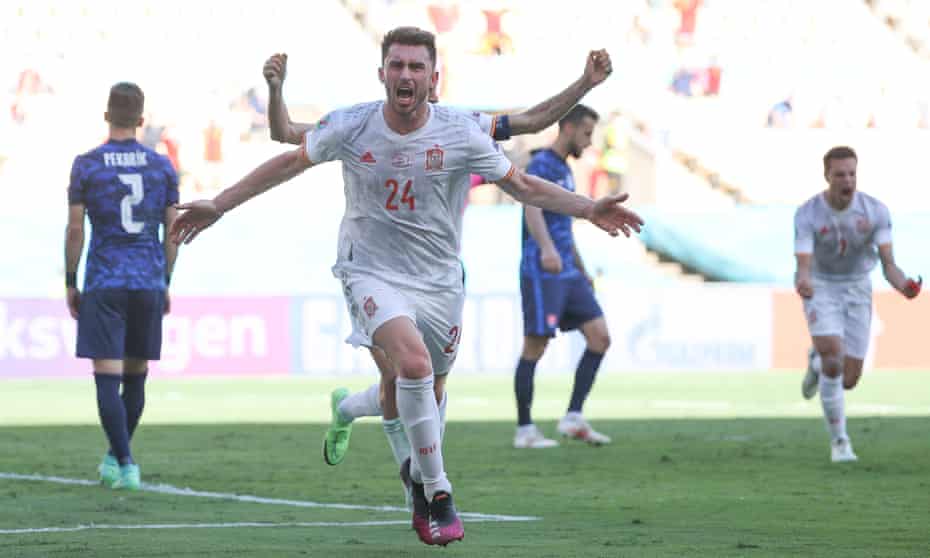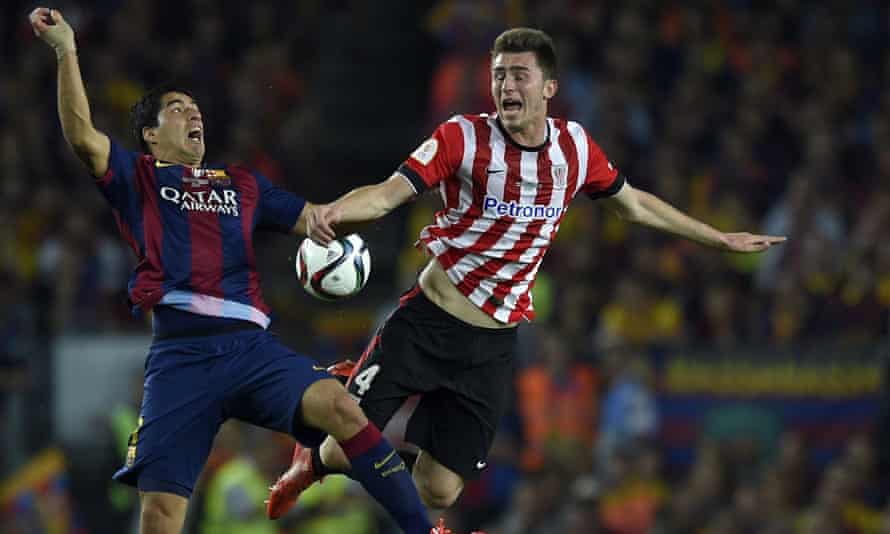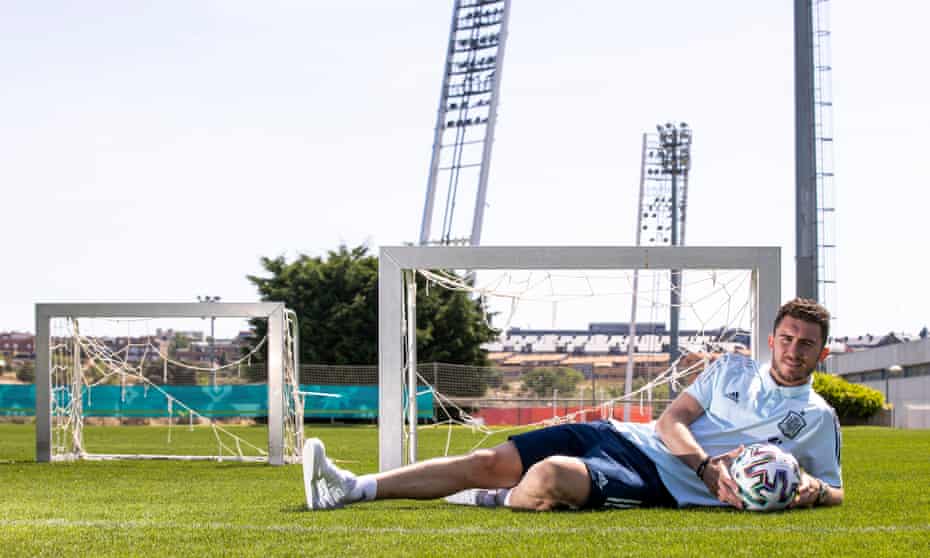“I come from a very small, humble French town,” Spain’s first-choice centre-back says. Aymeric Jean Louis Gérard Alphonse Laporte rocks back in a big red chair and looks back on how the “dream” he mentions repeatedly came true, if not exactly the way he imagined it, and forward to what comes next. He talks about the journey that brought him here with a directness and determination that helps explain it all. “I’m very happy, enjoying every moment,” he says.
It is the morning after Laporte stood before his Spain teammates and sang a Stromae track, initiation into the group complete. More importantly, that came after the 27-year-old jumped above the Slovakia defence to score his first international goal in his fourth game. Which is part of the reason they’re here preparing Spain’s meeting with Croatia in Copenhagen. Win that and … “And then it could be France, yes,” he says, audibly applying a full stop.
As the ball dropped to him, Laporte admits thinking “this could be the moment”, but the way he tells it more important was analysing the scene as it all unfolded, his header – “a balloon” – floating over Martin Dubravka and sending him sprinting to the touchline, shouting. “Vamos!” he recalls. “Vamos, and a swear word I shouldn’t say.”

What’s in a word? Many things, Laporte says. “Above all, the desire I had to compete at this level, to be where I am, enjoying every day with this great selección. The fruit of 22 years’ work, perseverance, objectives. One of my dreams came true, which is where that happiness and fury came through. A desire to show the fans I’m here to help, to contribute, not take anything away.” The need was natural: Laporte had only been in the Spain team three weeks; he had only been Spanish for five, nationality handed to him by discretionary government decree.
Born in Agen, Aquitaine, where his mum was a hairdresser and his dad worked for a supermarket, Laporte had previously played 51 times for France’s youth sides, captaining at under-17, under-18, under-19 and under-21 level. Three times he had been called up for the senior squad, but never played. Against Bulgaria and the Netherlands in October 2016, he was left in the stands; against Albania and Andorra in August 2019, he pulled out injured. In March 2017, he sat on the bench against Spain. Then on 4 June 2021, he finally made his international debut – with Spain.
“They called me from the Federación. The president told me about their interest. Straight after, Luis Enrique called. I took the decision. Then came my dual nationality.” Put like that, it was fast and simple. But as Laporte says, that’s the short version. “I’d been in contact with the selección española for years because they’ve always wanted me.”
It had first approached him about seeking a Spanish passport in 2016, when Julen Lopetegui was coach. If Didier Deschamps hadn’t always been convinced, Laporte was the perfect fit for Spain.
“Luis Enrique told me my playing style is his idea of football, that if I got nationality I might be in the squad. We talked and I told him that obviously it’s very important for me, for my projection. This is something I always wanted. To play at the highest level, at an international tournament is significant for any player. I said I was interested. There’s paperwork and all that [but] we found the formula.”
Did you tell France? They had called before, after all. “Six years before,” Laporte replies. And in 2019. “Ah, yeah, well. No. They didn’t call me. And while I don’t want to go over this again, I had sent a message and didn’t get a reply.” Deschamps had implied that he never got that message, sent six months earlier following Laporte’s injury, and that it would be a “lie” to suggest he had ignored the player. Laporte picks up his phone: “I have it here,” he says. “I’m not showing you, but I do. Maybe he changed number, got a new phone. Could be. I don’t know. But I replied to the same number he’d called from before.”
Did you get two blue ticks? Laporte smiles. “It wasn’t WhatsApp.”
“I didn’t get a reply then,” he continues. “And anyway, given everything that happened, nor did I think I was important enough to France to have to inform them of anything. My importance to them has been more a media issue than anything. I’ve always been very clear that I’m going to be with those that want me, not those that don’t. I’m not saying France didn’t want me, but I’m grateful to those that ‘bet’ on me. Spain did and I’m trying to return that faith.
“It wasn’t an easy decision at all. My family still lives in France and from very young I played there with the national team. There were family chats, discussions, an exchange of opinions, the same doubts there would be if you had dual nationality I imagine. ‘I feel this’, ‘you feel that’. Everyone has different feelings. I felt comfortable coming with Spain, fully identified. That’s what made me change everything. Also, my family hasn’t spent eight years in Spain like me.”
Laporte had played at Sporting Union Agen, for the Aquitaine representative team and Aviron Bayonnais before joining Athletic across the border aged 15, alone. His experience of Spain, he says, had previously been limited to school journeys and family holidays near Málaga, at five or six.

It wasn’t always easy, but he progressed fast, a technical central defender coached since by Marcelo Biesla, Ernesto Valverde, Pep Guardiola and now Luis Enrique, who insists: “having the ball at your feet is wonderful.” At Athletic, a club with Basque-only criteria which he fulfilled through an uncle and aunt on his father’s side and by playing for feeder club Aviron Bayonnais, he also got an early introduction to some of those questions of identity reappearing now.
“If I’m happy, as I am now, people can say whatever they like; it doesn’t affect me much,” he says. “It happened at Athletic too, where there were also more people in favour than against. I felt everyone’s support and was very comfortable. People who treat this as if it was so, so important have other objectives.”
What objectives? “I don’t know. Think about it yourself. You don’t need to decide anything. ‘I feel this’, ‘I feel that’. No. I feel both. I’ve been here eight years.” If people say you’re a ‘signing’, how does that make you feel? This time the response is sharp. “They can say what they want, I don’t care. I’m here. I’m happy.”
Besides, if Laporte is a signing, he’s a superb one, a leap in quality quickly integrated – although that was harder after the shutdown forced by Sergio Busquets catching Covid, which is why it took three weeks for him to sing before them. “We hardly saw each other, still less came into contact,” Laporte says. “Plus you have that fear, doubt: you’re ‘on alert’. But we’ve overcome that and it’s been natural for me. It’s as if I have been here 10 years.

“They welcomed me from the start. I knew most of them already. I had played them, so there are stories, jokes. I knew Unai Simón from Athletic. Four of us are from [Manchester] City. We’ve played Barcelona a thousand times. [César] Azpilicueta: lots of times.” He has also faced Adama Traoré and José Luis Gayá – for France’s U17s against Spain. Now, they’re all on the same team, preparing to face Croatia on Monday. And then maybe France.
“I don’t know what it would be like [facing them]; exciting, for sure,” he says. “And with a desire to win. I always wish them well but that’s how it is. Us first, then them.”
Deep down, would you prefer Switzerland? “I don’t prefer anyone. To tell the truth, I like to face the best, to compete to win … I come from a very small, humble French town, a humble family. I know where I come from and where I am. And being here is a step again, the pinnacle, and I couldn’t be more grateful to be able to compete at the highest level.”
from Football | The Guardian https://ift.tt/35XRLgc
via IFTTT

No Comment